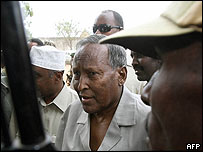BBC NEWS
Modnay, July 17, 2006
Somalia’s interim President Abdullahi Yusuf has dropped his opposition to talks in Sudan with Islamist leaders who control the capital, Mogadishu.
He boycotted talks with the Union of Islamic Courts, accusing them of breaking a previously agreed ceasefire.
But he was urged to reconsider after pressure from the parliamentary speaker and diplomats meeting in Belgium.
The International Contact Group, made up of western and African countries, rejected sending foreign peacekeepers.
Meeting in Belgium, it issued a final communique urging broad-based talks among all Somali groups.
It backed training and equipping a Somali army and police force, but did not endorse an African Union plan to deploy troops to the country in support of President Yusuf.
 President Yusuf only controls small parts of Somalia |
The president’s weak, UN-backed government wants peacekeepers and a lifting of the weapons ban to rebuild security forces.
But Islamist leader Sheikh Hassan Dahir Aweys has said there is no need for peacekeepers, as the UIC have reunited the capital under their control after 15 years of anarchy and conflict.
Mr Aweys has denied US accusations that he and the UIC have links to al-Qaeda.
He also criticised the UN Security Council, which last week said it would back moves to lift the arms embargo and send peacekeepers.
“The problem of Somalia is not a lack of weapons, but a lack of peace and understanding of each other,” he told the AFP news agency from his home in Galgadud, central Somalia.
Conflict fears
The UIC controls much of southern Somalia but another Islamist leader, Sheikh Sherif Sheikh Ahmed has been quoted denying reports the Islamist forces were planning to attack the government at its base in Baidoa, 200km from Mogadishu.
“We are making it clear that we are not planning to attack Baidoa, Kismayo or any other third region in the country. We want to work with whoever who wants to return peace to Somalia,” he said, according to the Somalia’s Puntlandpost website.
Some fear that Somalia could descend into renewed conflict between the UIC and the government, possibly involving regional and international players.
Eritrea is accused of arming the UIC, while Ethiopia is seen as close to the government.
The UIC has accused Ethiopia of already sending troops to Baidoa but both governments have repeatedly denied such claims.
The International Contact Group was set up by the US after the Islamists seized Mogadishu last month.
Source: BBC NEWS, July 17, 2006






